Aeneas, with his unique blend of divine and human heritage, was not just a hero from Troy. He played a pivotal role in the establishment of Rome. His courage and tenacity in the face of defeat during the Trojan War served as the embodiment of Roman virtues. His epic journey from Troy to Italy, punctuated with encounters with gods and prophecies, didn’t just shape his fate, but also charted the course for Rome’s destiny.
In ‘The Aeneid’, Virgil’s epic poem, Aeneas’ heroic adventures, his trials, and his encounters with deities gave Romans a mirror to view themselves and their society, as if guided by a divine hand. Looking closely at Aeneas’ influential character can provide fascinating insights. His extraordinary, timeless stories continue to influence our contemporary perceptions of what it means to be a hero and how we understand fate.
Aeneas Origins and Parentage
When we start to peel back the layers of Aeneas’s backstory, we see the unique blend of godly and human ancestry that shapes his extraordinary fate. Aeneas, a half-god, is a notable character in Greek and Roman myths. His mother is the goddess Aphrodite, or Venus as she is called in Roman stories, which gives him exceptional heroic qualities and a divine trajectory.
On the other hand, his father is the Trojan prince Anchises. This human connection grounds Aeneas’s story and makes it something we can all relate to. This mix of divine and mortal ancestry gives Aeneas a mission, pushing him to found Rome. His long-lasting impact is this merging of the godly and human worlds, which highlights why Aeneas remains an important figure in mythology.
Aeneas in the Trojan War
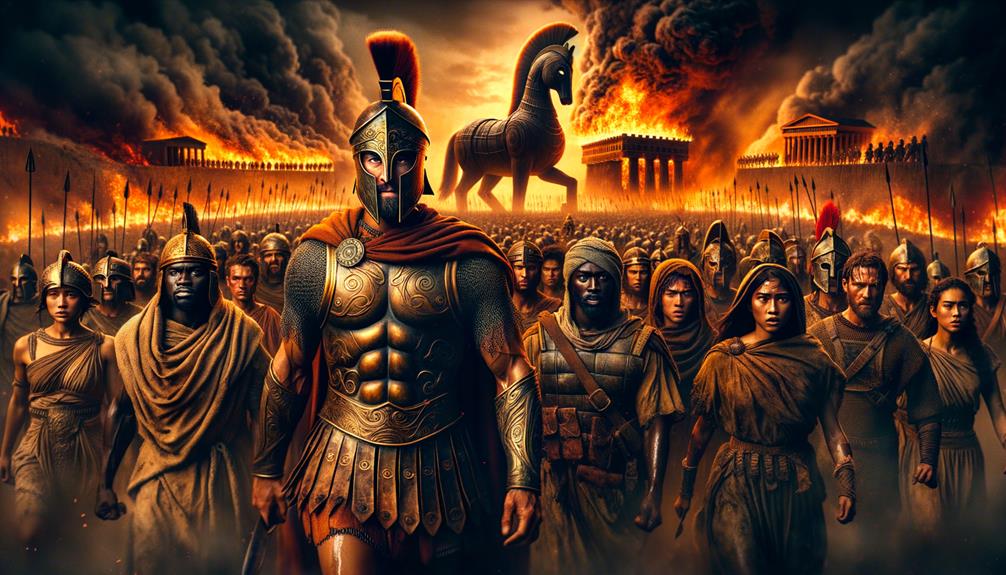
Aeneas, the Trojan hero, was truly formidable in the Trojan War. He stood out as a courageous leader of the Dardanians, showing off his heroic nature, even when he faced defeat against some of the Greek heroes such as Diomedes and Achilles. He lived through the war, due to some divine help, and this event became the kickstarter for his epic adventure, which we know from the Aeneid.
| Trojan War | Aeneid | Roman Virtue |
|---|---|---|
| Aeneas, the Trojan hero, showcased exceptional courage and leadership. | His life after Troy is the bedrock of this epic tale. | His resilience and determination make him a beacon of Roman virtue. |
| He fought fearlessly against Greek heroes. | The Aeneid tells Aeneas’s journey to Italy, cementing his place in Roman mythology. | He’s the legendary founder of Rome, embodying Roman ideals. |
| The war, while a defeat, brought Aeneas’s heroic qualities to the forefront. | Divine help in Aeneas’s life marks him as a special one. | Aeneas was the embodiment of persistence, a key Roman virtue. |
Let me tell you about Aeneas, the Trojan hero – he was an epitome of virtue, a legend in Roman mythology.
Journey and Adventures of Aeneas
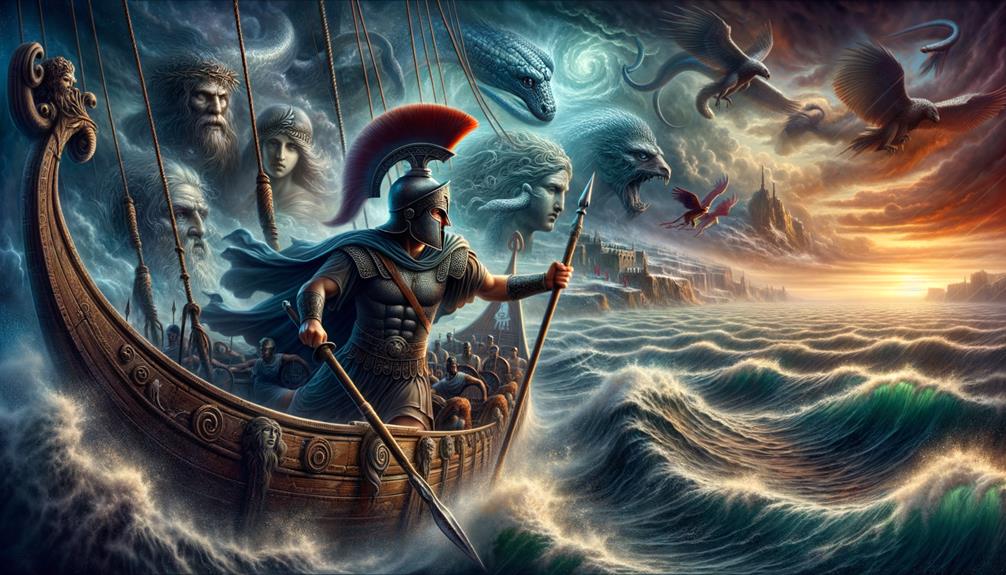
Let’s explore the incredible saga of Aeneas, our Trojan protagonist who journeyed through a world of gods and mythical beasts. His epic trip from the charred remnants of Troy to the lush soil of Italy is a tale of perseverance, foresight, and destiny. As he journeyed, his interactions with heavenly entities and his final landing in Italy not only moulded his path but also the course of a budding empire.
Aeneass Legendary Voyage
Have you ever heard about the epic journey of Aeneas in Roman mythology? This Trojan king is a real legend. After Troy fell, Aeneas didn’t just sit around. He embarked on a grand adventure to Italy. His trip wasn’t your average sightseeing tour either – it was filled with intense battles, divine meetings, and prophecies that would ultimately chart the future of Rome.
This isn’t just some ancient tale, though. Aeneas’s journey is deeply rooted in Rome’s collective consciousness. Think about it – a Trojan King, setting off on an epic journey, and through his actions, managing to intertwine his will with that of the gods. He fulfilled prophecies and fought battles that would lay Rome’s foundation.
It’s more than just a great story. This journey is a vital part of Rome’s identity and cultural heritage. It speaks to their resilience and the timelessness of their city. So next time you think of Rome, remember Aeneas. His journey is a testament to the city’s enduring spirit.
Encounters With Divine Beings
Isn’t it amazing that Aeneas, throughout his epic voyage, had mystical encounters and significant prophecies that defined his fate and, in the end, the destiny of Rome? Under the protective wing of Aphrodite, the Greek goddess, Aeneas journeyed from Troy to Carthage, where he crossed paths with Queen Dido. Their ill-fated love story, ‘Aeneas and Dido,’ is a saga filled with deep emotion and deception.
While in Sicily, Aeneas organized commemorative games in tribute to his late father, Anchises. Here, he was privy to a prophecy regarding the Trojan Royal family and his future daughter, Lavinia. Later, he found himself in a crucial battle with King Latinus, a testament to his fierce Trojan warrior nature.
| Encounter | How It Affected Aeneas | Outcome |
|---|---|---|
| Protection from Aphrodite | Survival in battle | Set sail to Carthage |
| Crossing paths with Dido | Heartbreaking romance | Aeneas’s departure |
| Anchises’s memorial games | Prophecy unfolds | Voyage to Italy |
| Confrontation with King Latinus | Readied for battle | Triumph over Turnus |
| Lavinia’s prophecy | Gained insight into the future | Establishment of Rome |
Arrival in Italy
After surviving the collapse of Troy and a journey filled with divine incidents and obstacles, Aeneas, alongside his father Anchises and son Ascanius, at long last steps onto Italian ground. This marks the start of his predestined role as the famed founder of Rome. The trip of this Trojan prince to Italy was anything but easy. He had to deal with everything from storms stirred up by Juno to a fervent and ill-fated romance with Queen Dido. Aeneas and his crew had to tackle more than their fair share of hardships. But when they landed in Italy, they didn’t take a break. Aeneas got straight to work, getting ready for battle against the Latins. His ultimate victory over Turnus confirmed his part in the creation of Rome, paving the way for his descendants to build the impressive city.
Aeneas Role in the Aeneid
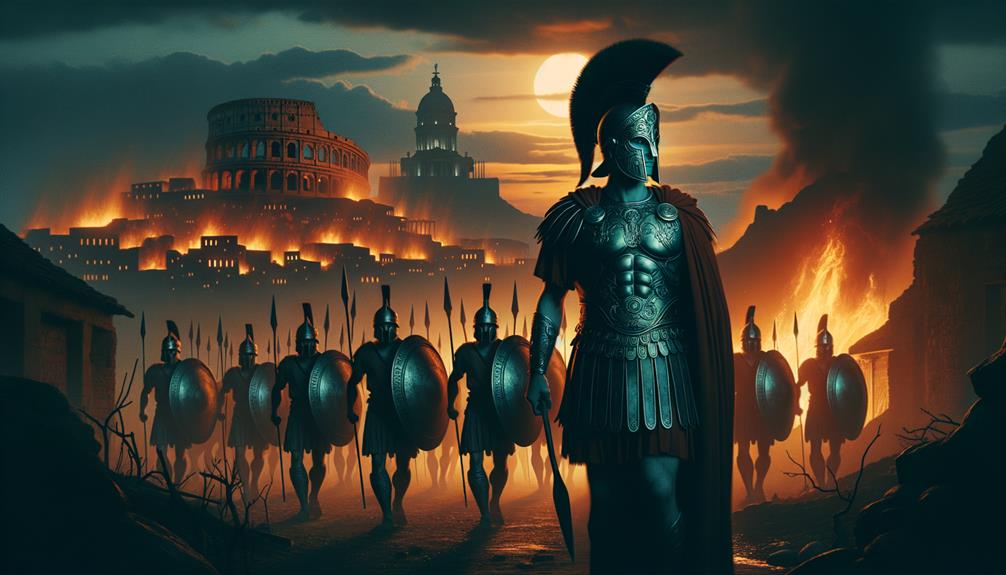
In Virgil’s epic, the Aeneid, the protagonist Aeneas takes center stage. He’s not just a hero who’s been given a divine mission to build a new home after Troy was destroyed, but also a figure who wrestles with destiny and interacts with gods and mythical characters. His character traits, like his devoutness, bravery, and leadership skills, shine through as he faces various challenges. Aeneas is the son of Anchises, a Trojan prince, and his journey from Troy is filled with obstacles, divine meddling, and meetings with gods. Throughout all this, his strong devoutness, bravery, and leadership skills are pushed to their limits. In the end, he fulfills his destiny by founding Rome, laying the groundwork for its future greatness. So, in the Aeneid, Aeneas plays a pivotal role, his heroic journey mirroring how the Romans viewed themselves – as a civilization destined by the divine.
Aeneas Influence in Roman Mythology
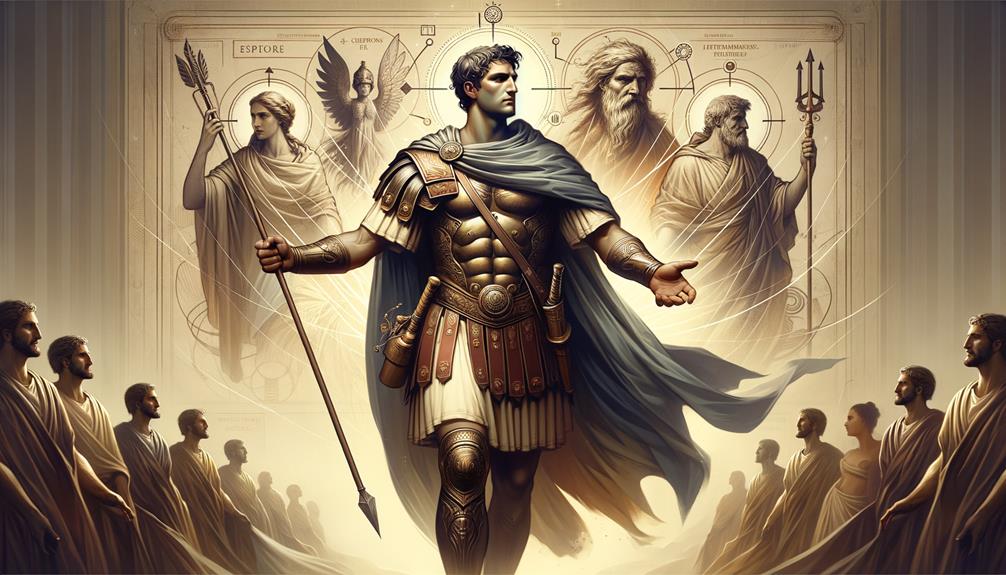
Aeneas, the legendary founder of Rome, has a lot to do with how we see Roman mythology today. As a hero of the Trojan War, he’s not just a key player in Roman history and identity, but he’s also had a big hand in shaping their literature, art, and culture. After the war, he led his people to Italy, setting in motion the events that would lead to Rome’s rise.
Here’s how Aeneas left his mark:
- Roman emperors claimed a line of descent from him, lending credibility to their rule.
- His daring journey in the Aeneid kicked off a wave of heroic stories in Roman literature.
- The Romans, as his descendants, saw themselves as living his legacy, which helped forge their Roman identity.
- His myth has had a long-lasting effect, leaving its stamp on Roman culture for generations.
Modern Interpretations and Depictions of Aeneas
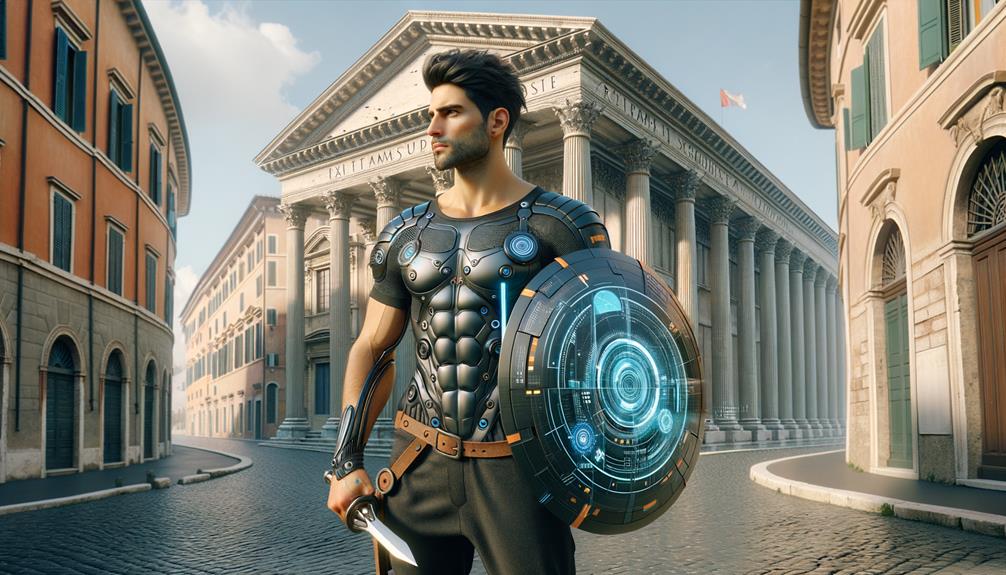
Aeneas? Oh, you’ve got to hear about this guy! He’s the Trojan hero whose epic story has been spruced up and reimagined for our modern times. You’ll find him in all sorts of places, from grand opera houses to the vibrant world of video games. It’s pretty cool to see how different artistic mediums have reinterpreted his story, beautifully blending myth and today’s culture.
Let’s chat about these various portrayals, really digging into how they bring Aeneas’ journey to light in new ways. We’ll look at how these modern adaptations have kept the essence of his story alive while giving it a fresh spin. Plus, we’ll see how his legacy continues to shape contemporary culture. Trust me, it’s a story worth telling.
Aeneas in Contemporary Literature
In the current literary scene, Aeneas is a captivating character, refreshed and revived through contemporary retellings of his epic adventure. As a Trojan hero, his mythological journey and heroic exploits come alive in today’s literature, striking a chord with modern readers.
- We get to see his inner struggles, giving us a relatable depiction of human conflicts.
- We get a deeper look into his relationships, uncovering intricacies often missed in older interpretations.
- We’re presented with his moral predicaments, prompting us to think about what being a hero really means.
- His tale reaches us via various channels, like novels, graphic novels, and online platforms.
These new takes ensure that Aeneas continues to be a fascinating figure in our contemporary discussions about literature.
Aeneas Depiction in Art
Aeneas pops up in all sorts of modern art these days, with artists from every corner of the world putting their own spin on his epic story and his role in Rome’s founding. You can see him in all kinds of art, from paintings and sculptures to digital creations, which really highlight how important he is in mythology.
Artists use their skills to bring Aeneas’ battles and triumphs to life, often including key characters like Dido and Turnus. The art they make captures age-old ideas of destiny and bravery, showing Aeneas was indeed the founder of Rome. These artistic stories do more than just make us understand his mythological history better, they also inspire us to look at our own lives and how we face the curveballs life throws at us – it’s like going on our own heroic journey.
Frequently Asked Questions
Why Is Aeneas a Trojan Hero?
Well, the reason Aeneas is seen as a hero goes a little something like this. First, the guy managed to survive the destruction of Troy, which is quite the feat in itself. Then, he went on to establish Rome, which is pretty impressive. On top of that, Aeneas was known for his moral integrity and courage, qualities that are highly valued in a hero. Plus, he comes from a line of gods and was a formidable leader in battle, which adds to his heroic image.
Who Was the Roman Hero Aeneas?
Hey there, let me introduce myself. My name’s Aeneas, a quite well-known chap in Roman mythology. My dad’s a regular guy named Anchises, but my mum, Aphrodite, is a goddess. I’m probably most famous for surviving the fall of Troy and then making my way to Italy. Plus, I’m related to Romulus, who went on to kick-start Rome. Not bad, huh?
What Did Aeneas Do for Rome?
You know me as Aeneas, the guy who led his people all the way from Troy to Italy. I laid the foundation for the city of Lavinium and ended up being the great-great-grandfather of Rome’s founders, Romulus and Remus. You could say that my journey and the establishment of our new home played a big role in Rome’s future success.
How Did Aeneas Betray Troy?
You know, it’s kind of interesting if you think about it. Some might argue that Aeneas actually betrayed Troy when he left it in the midst of its downfall. The gods had told him to go create a new homeland, and that’s exactly what he did. I mean, sure, some folks saw it as a betrayal, but let’s not forget that his actions were a key factor in the birth of Rome. So, you can see it from different angles.


